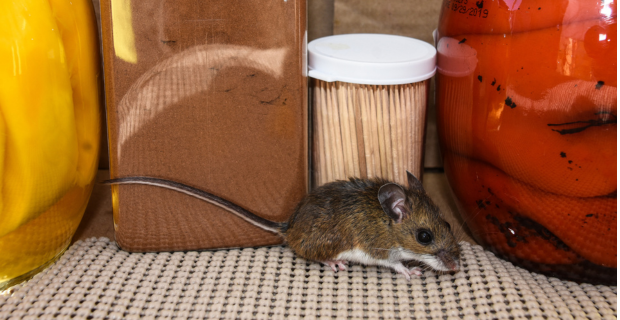Date Published: 2024/07/09
Read Time: mins
Keeping rodents out of your RV

There’s something amazing about a long trip in an RV, disconnected from chores like cutting the grass or other day-to-day hassles of life. Nothing can spoil that faster than finding out there are rodents in your RV. You’ll not likely notice them outright but rather through the droppings they leave around cabinets or little chew marks on packages, often rodent damage is not covered under insurance. Keeping rodents out of your RV is a priority for sanitary reasons as well as overall peace of mind.
How do you do that? Here are some helpful steps you can take right now.
Start with preventative measures
A few simple things you can do around your RV before, during, and after your trips can minimize the risk of rodents getting into your RV.
- Keeping your RV clean: This is a big one. Mice are incredible at pinpointing a food source, and they don’t need much to make the decision to move into your RV. Crumbs, leftover food, and opened packages of dry goods will bring them in. It’s best to store food in sealed containers and clean up crumbs as quickly as possible.
- Seal up the RV: Work your way around the interior and exterior of your RV to seal off any possible entrance point. Look for small problems, like cracks in connection points or holes in the flooring. Always use a flashlight to check the back of cabinets for holes or damage.
- Store your RV on concrete: If you have the option to store your RV on a concrete pad, that seems to help reduce rodent traffic, as does avoiding long-term storage in heavily wooded areas.
- Add some scents to your RV: Some scents can deter rodents. Placing peppermint oil, cloves, or cayenne pepper in areas around your RV, especially outside, can make it less appealing to some rodents.
Be careful using traps and bait systems. These often work by luring rodents into them with what seems to be a good food source. They take that back to their nests, where they end up dying. You’re never going to eradicate all of the rodents around your RV’s exterior. So, these bait traps simply encourage them to come in to explore your RV instead.
What to do when you already have rodents in your RV
The first thing to know is that it’s not uncommon for rodents to make their way into RVs. They are warm places free from predators that are often untouched by humans for long periods of time. Still, you don’t want them there. Here are some strategies for keeping rodents out of your RV after they’ve made their way in.
- Do a deep clean. That means removing everything, sanitizing surfaces using bleach or another cleaning agent, and really scrubbing down the appliances, plumbing, and all other surfaces. Don’t forget the floor, ceiling, and walls.
- Consider trapping them. If you are planning to move your RV, use humane traps to capture the rodents and then move them to a different location, such as a wooded area a few miles away.
- You can turn to a professional: If there is a significant infestation, have a professional exterminator come to your home as a first step. They will investigate the scale of the problem and then offer recommendations to remove them safely without risk to your health and well-being. Then, deep clean.
Also, note that rodents are scavengers who need to eat on a constant basis in order to live and reproduce. If your RV is stripped clean of any food source, it will no longer be desirable to them. Often, they will move on to other locations where they can find food sources.
Using lights, keeping a cat around the area, and applying scented products, as mentioned earlier, can also help to discourage them from staying in your RV. The last thing you want is for nests to occur, and the best way to keep that at bay is to make your RV less desirable.
Need some help protecting your RV?
At Orbit Insurance Services, we offer comprehensive support for you as you prepare to head out on the road. Let us update your RV insurance now to ensure it keeps you financially secure. Request a quote for RV insurance now.